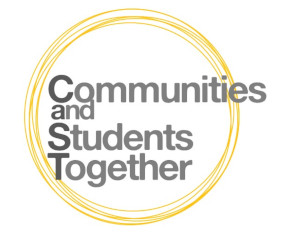NEW! CaST Anthology now available
The fourth intellectual output of the Erasmus+ project CaST- Communities and Students Together is now available:
the CaST Anthology “Engaged Learning: Voices Across Europe”, coordinated by Mary Griffith of the University of Malaga(Spain).
This anthology is the culmination of the Erasmus+project Communities and Students Together (CaST) and provides an opportunity for leaders in the field of Engaged Learning, as well as representatives from civic and civil society and Higher Education Institutes, to gain new insights into the area of Engaged Learning. The outputs of the CaST project, including the innovations developed and piloted by the project partners, will frame this volume.
The truth is Engaged Learning is complex, it involves multiple stakeholders, multiple directions and multiple actions and, in the case of CaST, multiple
universities in multiple countries. Engaged Learning tries to shed light on these varied perspectives and oftentimes finds that Engaged Learning means different things to different people. CaST has given us many ways to explore perspectives across Europe and many lessons have been learnt. In this volume, we connect the ‘voices’: from the Higher Educational Institutions, from student perspectives, from our own as faculty/researchers, as well as those from the community.
We will discuss Engaged Learning in the context of CaST. This is a broad topic, and we begin by simply stating that Engaged Learning is about moving from good intentions to actions.
Chapter one (Spain) - Turning good Intentions into Actions - will provide an overview of stakeholders and discuss the trans-disciplinary approach where these intentions are turned into actions. By discussing our actions, we aim to establish a starting point for lessons learnt.
We frame the idea that Engaged Learning is about actions born from good intentions. When we begin with good intentions, it is perhaps easier to find consensus. For the institution, Engaged Learning lies under the category of ‘lofty goals.’ Oftentimes, in Higher Education Institutions we see Engaged Leaming alongside other lofty goals: internationalisation, inclusion or equality, social responsibility, employability or sustainability. Indeed, Engaged Learning is a mindset of good intentions.
Chapter two (UK) - Institutionalisation of Engaged Learning - will discuss the pros and cons of institutionalising Engaged Learning, with a focus on the University of Exeter where they have used design thinking to understand what structural changes need to be made to support this pedagogical approach.
Engaged Learning involves looking at the community as final users of student led projects. When we turn our attention to students, we observe that projectbased learning is key to developing skills and expertise. University students are expected to put theoretical knowledge into practice.
Chapter 3 (Belgium) - Engaged Learning for the Early Career Researcher: How Do They Find Their Place in an Undefined Terrain. Students seem to respond better to initiatives embedded in the curriculum and clearly students’ perspectives must be explored within their degrees, but also after graduation. Marsh and Klima discuss Engaged Learning by targeting early career researchers before they move into the community or further academic roles with their project at Ghent University.
Chapter 4 (Germany) - Headstand Stories: Engaged Learning Local Pioneers’ Perspectives. Here it is playfully suggested there are things not to do. The chapter is a humorous self-reflection on one's own shortcomings and mistakes, but also always encourages readers to consider how one could have done it better. The intention of Engaged Learning is a way for the University to reach out to the community and to build bridges between stakeholders through a series of actions.
Chapter 5 (Finland) - Expectation Management: An Obligatory part of Engaged Learning Initiatives. It is important that we examine the stakeholders by making key connections with the community. Furthermore, as the Turku team highlights, managing expectations should be an obligatory part, when involving the community partners. The community doesn’t necessarily need to think about curriculum, employability or even research. The community cares about solving, sometimes urgent, problems. They are concerned with how to create working networks where good intentions become real actions.
Chapter six - Engagement between the University and Voluntary, Community and Social Enterprise Sectors. This contribution discusses the
relationship between the academy and the community and offers recommendations for how we can improve this engagement from the community perspective. “For genuine partnership to flourish and endure, it must be founded, not in paternalism, or limited transactional connection, but in
mutual benefit (Frost, 2022, this volume). It is through our relationships with community partners, that Engaged Learning builds these connections for actions to take place.
CaST Anthology “ Engaged Learning: Voices Across Europe”
Also available from the "Download" section of the CaST website.
In the "News!" section CaST Anthology “Communities and Students Together (CaST). Engaged Learning: Voices Across Europe” - Summary in all languages is also available.
Archives
- 10/11/2022 - NEW! CaST Anthology now available
- 25/09/2022 - NEW! CaST Toolkit now available
- 04/04/2022 - NEW! CaST FINAL International Conference in MALAGA on April 28th
- 01/04/2022 - NEW! CaST Pilot Synthesis now available
- 25/04/2021 - NEW! Ghent University Podcast on "A dash of SaLT": Discussions with experts on Sociology and Learning Theory in today’s society.
- 26/02/2021 - NEW! Case Study Compendium now available
- 25/02/2021 - CaST First On line Symposium on Community Engaged Learning. A follow-up
- 20/02/2021 - An insight on WP2: State-of-the-Art Review
- 19/02/2021 - CaST first symposium on Community Engaged Learning - Thursday 25th February 2021
- 25/11/2020 - Welcome to the CaST project and website
- 24/11/2020 - Next CaST Partner meeting online: Ghent, 26 November 2020

